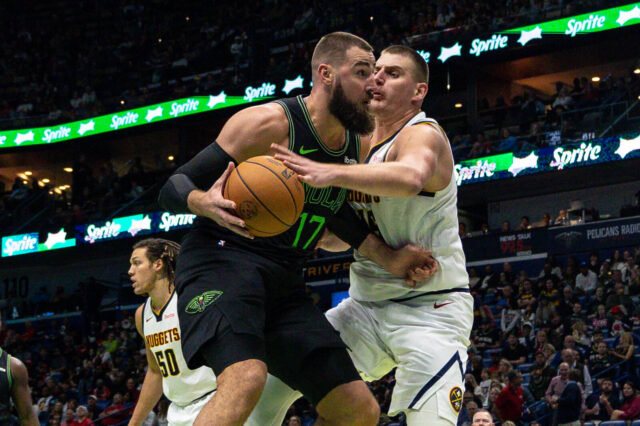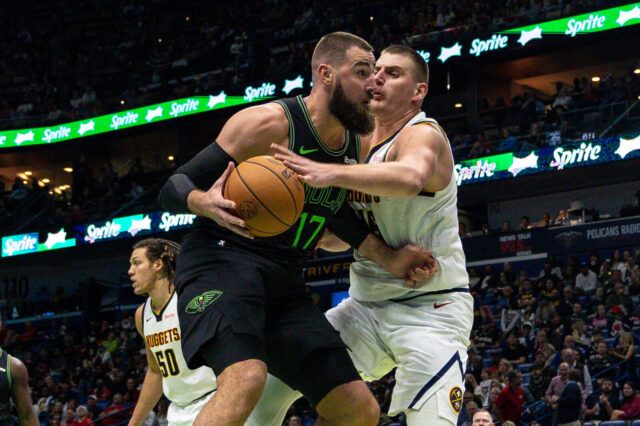It all starts and ends with Joker.
After betting on the Serbian center with a five-year, $146 million contract during the 2018 offseason, Nikola Jokic exploded onto the scene during the 2018-19 season. Though his previous three years set up the possibility of a dominant season, it was all on him to take that next step, to put his skills on display for an entire season.
The Nuggets needed him to be at his best quickly. Will Barton, Denver’s newest starter at small forward, went down with a major injury in just the second game of the season. During the month of December, Denver spent a significant stretch down three starters—Barton, Gary Harris, and Paul Millsap—and replaced those three with Torrey Craig, Juancho Hernangomez, and Mason Plumlee. Denver needed their superstar to step up, as well as their believed up-and-coming star guard in Jamal Murray, to carry the load. During December, Jokic averaged roughly 21 points, 10 rebounds, and eight assists while playing 33.8 minutes per game. It wasn’t an extraordinary stat line, but with all of the attention Jokic received during this stretch, it solidified his ability to carry the team during difficult stretches, exactly as an MVP should do (for reference, Murray also raised his game during this stretch and averaged over 21 points and five assists per contest).
But for the Nuggets to reach their next level, Jokic will need to reach both a higher level of consistency during the season and a higher ceiling against the toughest teams in the NBA. When looking at his month-by-month splits, the period of time that stands out most definitively is November, in which Jokic averaged just under 14 points per game on 51.6% True Shooting, one of the lowest efficiency marks of his career. During November, Jokic scored in the single digits six total times, with his worst performance coming against the Memphis Grizzlies and attempting just one shot. During the rest of the season combined, Jokic scored in the single digits just twice, once in a game in which the San Antonio Spurs doubled him whenever he had the ball, and once against the Utah Jazz at the end of the season in which he fouled out of a frustrating affair.
Cutting out these radically inconsistent scoring performances will elevate Jokic to another level as a scorer. If Jokic had averaged 20 points per game during the month of November as opposed to his actual 13.9 points, his season average would change drastically, rising from 20.1 to 21.2 points per game. That may seem like a minimal amount, but Jokic would be tied for 21st in points per game as opposed to last year’s 29th by simply improving his level of consistency without even factoring in other possible improvements.
The next factor is recovering his three-point shot. After hitting a career high 39.6% of his threes during the 2017-18 season, Jokic regressed to 30.7% in 2018-19, a drastic difference in the value of attempting a three. In 2017-18, only Karl-Anthony Towns hit three-pointers at a higher efficiency than Jokic on a similar volume. In 2018-19, the only center Jokic topped in terms of perimeter shooting efficiency was Joel Embiid. So much of Jokic’s gravity as a playmaker on the perimeter comes from his ability to hit jump shots at a high clip. The Nuggets offense needs Jokic to hit those shots at a higher clip. Assuming all other scenarios are equal, if Jokic shoots 35% on his threes instead of 30.7% this past season, Denver’s team Offensive Efficiency jumps into the Top 5.
The last time a league MVP won the award while scoring under 24 points per game was Stephen Curry in 2014-15, in which the Warriors won 67 games and were the NBA Champions. Jokic can only control so much of the narrative with his play, and the Nuggets as a whole would likely have to cross 60 wins to push that narrative and for analysts to seriously consider him.
Tangible statistical improvement from Jokic means jumping up in points and maybe assists per game this year. That’s what many voters want to see—a large role in contributing to a team’s wins where there’s zero doubt about the most important contributor. Very few teams with multiple stars that contribute similar value are rewarded with an MVP award, even if they are on an elite team. Jokic is in a unique position as a primary star on a team with the capability to win 60 games this year, but Denver won’t accomplish that goal unless Jokic takes individual steps too.
I’ve learned to not doubt Joker though. He elevated his game when the team needed him, with multiple starters injured, in multiple playoff series as the best player on the court, and in clutch situations when the Nuggets needed a basket. Imagining him putting everything together and reaching a new level of production isn’t just a positive outcome.
MVP level performances are almost the expectation now.


